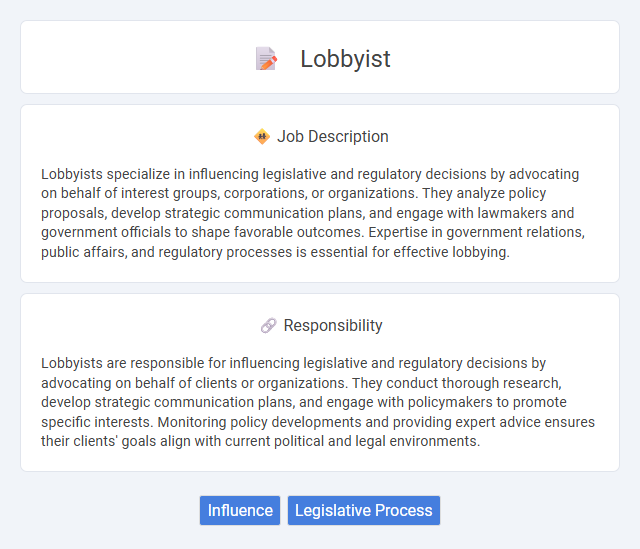
Lobbyists specialize in influencing legislative and regulatory decisions by advocating on behalf of interest groups, corporations, or organizations. They analyze policy proposals, develop strategic communication plans, and engage with lawmakers and government officials to shape favorable outcomes. Expertise in government relations, public affairs, and regulatory processes is essential for effective lobbying.
People with strong communication skills and a deep understanding of political systems are likely suitable for a lobbyist job. Individuals who handle high-pressure environments well and are comfortable with networking and persuasive strategies will probably thrive in this role. Those who struggle with ethical dilemmas or prefer a stable, routine work environment may find this career less suitable.
Qualification
A lobbyist typically requires a bachelor's degree in political science, law, public administration, or related fields to navigate legislative processes effectively. Strong communication, negotiation, and research skills are essential for influencing policymakers and advocating for clients' interests. Experience in government, law, or advocacy organizations enhances their ability to analyze legislation and build strategic relationships.
Responsibility
Lobbyists are responsible for influencing legislative and regulatory decisions by advocating on behalf of clients or organizations. They conduct thorough research, develop strategic communication plans, and engage with policymakers to promote specific interests. Monitoring policy developments and providing expert advice ensures their clients' goals align with current political and legal environments.
Benefit
Lobbyists likely provide significant value by effectively representing client interests to lawmakers and regulatory agencies, potentially influencing policy decisions in their favor. Their expertise in navigating complex political landscapes may increase the probability of favorable legislative outcomes, benefiting businesses and organizations. Strong networks and communication skills probably improve access and advocacy success, enhancing strategic advantages for their clients.
Challenge
The lobbyist job likely involves navigating complex regulatory environments and managing diverse stakeholder interests, which may present significant challenges. Balancing persuasive advocacy with ethical considerations probably requires strong communication skills and strategic thinking. Encountering opposition or shifting political landscapes might increase the difficulty of achieving desired outcomes.
Career Advancement
Lobbyists can advance their careers by building a strong network within political, corporate, or nonprofit sectors and demonstrating expertise in policy analysis and strategic communication. Gaining specialized knowledge in industries such as healthcare, technology, or finance enhances their value and opens opportunities for senior roles like government affairs director or corporate lobbyist chief. Professional certifications like Certified Lobbyist or participation in advocacy training programs further strengthen credentials and promote career growth.
Key Terms
Influence
Lobbyists specialize in influencing government policies and legislative decisions by effectively communicating the interests of their clients, which may include corporations, advocacy groups, or non-profits. They utilize strategic networking, research, and persuasive communication to shape public policy and regulatory outcomes in favor of their sponsors. Their influence is measured by their ability to build relationships with lawmakers, navigate political processes, and advocate for specific legislative changes or funding allocations.
Legislative Process
Lobbyists play a critical role in the legislative process by influencing lawmakers and shaping policy decisions through targeted communication and advocacy strategies. They analyze proposed bills, provide expert information, and build relationships with legislators to promote specific interests or agendas. Effective lobbying can accelerate legislative action, ensuring that stakeholder perspectives are considered in the creation of laws and regulations.
 kuljobs.com
kuljobs.com